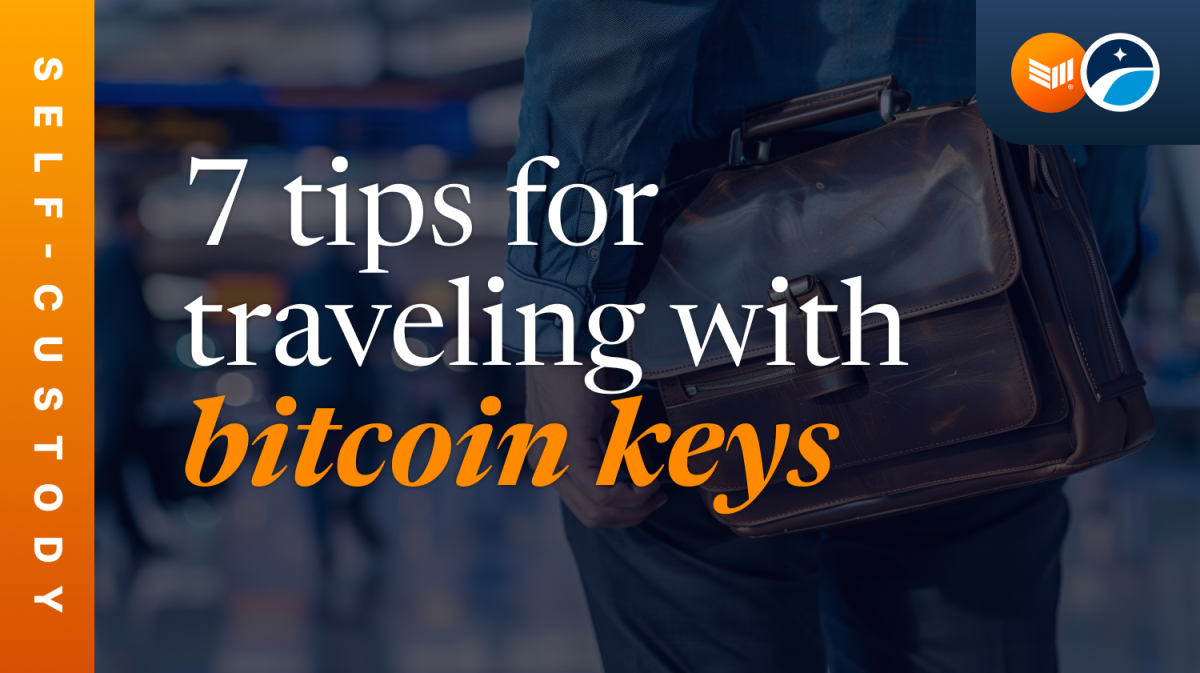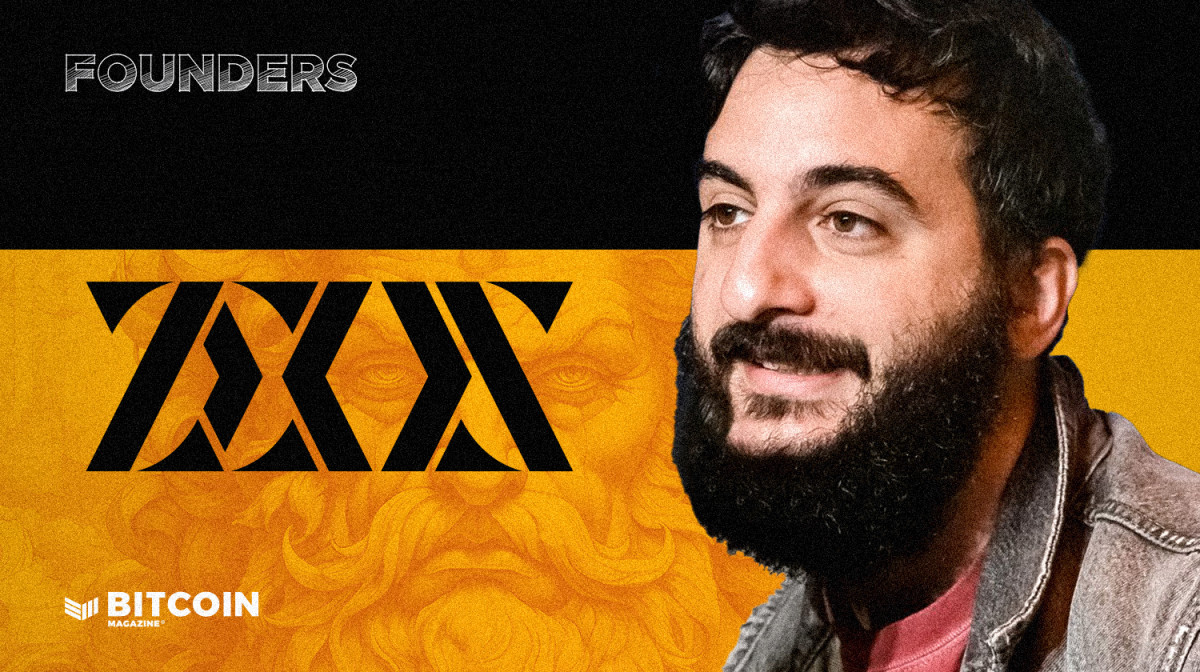Month: May 2024
7 Tips For Traveling With Bitcoin Keys
Originally published on Unchained.com.
Unchained is the official US Collaborative Custody partner of Bitcoin Magazine and an integral sponsor of related content published through Bitcoin Magazine. For more information on services offered, custody products, and the relationship between Unchained and Bitcoin Magazine, please visit our website.
Visit unchained.bitcoinmagazine.com for resources and special offers to upgrade your bitcoin security.
Properly taking control of your keys requires taking on some additional responsibility, but it’s an essential part of bitcoin security. But what happens when you need to travel? If you hold large amounts of bitcoin in cold storage, should you carry the keys to your bitcoin wallet with you? And if you do travel with one or more keys, what steps do you need to take to stay secure?
Consider these seven tips for traveling with your bitcoin in a way that keeps you in control while minimizing risk.
1. Carry only the wallets you need
Bitcoin allows you to segregate funds into multiple wallets so you only need to carry the keys you need for smaller amounts of bitcoin. You can secure your bitcoin savings in cold storage multisig, while still carrying some sats in a hot wallet on your phone like BlueWallet or Muun.
By only carrying keys to the wallets you need, you can spend and receive bitcoin while leaving the majority of your savings in a secure cold storage setup, such as multisig, that eliminates single points of failure.
2. Consider your destination
Consider your destination and travel plans when evaluating the risks of traveling with your bitcoin keys. What is the relative crime risk at your destination? Is your destination a high-crime nation or city? What will your surroundings be like?
If your destination has higher crime rates or pervasive petty theft, assume your phone will be stolen. Keep good smartphone security, and avoid holding keys to significant amounts of bitcoin on that device. Minimizing potential bitcoin losses by only keeping small amounts in mobile wallets is one consideration, but even storing keys to multisig wallets on your smartphone when traveling can increase the chances of compromise, necessitating an arduous key replacement.
If you’re traveling to an event where ownership of bitcoin is assumed, adjust your security model around the assumption that everyone knows you own bitcoin. That could mean ensuring that any singlesig wallets have a passphrase, or securing smaller amounts of bitcoin with multisig and distributing the keys in your belongings while traveling.
3. Avoid traveling with seed phrase backups
You should always secure your seed phrases, but remember that they are the unencrypted secret for a given key, making them much easier to compromise than a hardware wallet. While your hardware wallet’s private key data is generally secured within a secure element, behind a PIN, and requires a PC to access, seed phrase backups are easier to physically steal, copy, or photograph.
For most normal travel, you should leave your seed phrase backups in a secure storage location and travel with one or more hardware wallets.
Visit Unchained.com for $100 off any Unchained financial services product with code “BTCMAG100”
If you must travel with a seed phrase backup
You might need to travel with a seed phrase backup in some situations. Moving permanent physical residences (we published a guide that you should read if this is your situation) and traveling to set up a safely-stored key item in a multisig setup are both reasonable reasons to be traveling with your 12- or 24-word seed phrase.
If you must travel with a seed phrase, there are things you can do to minimize the chance of exposure and retain peace of mind:
Remain inconspicuous in airport security: Put a paper seed phrase backup inside a book, or split up a seed phrase by writing it in a physical notebook using some convention that you will remember. Avoid using suspicious metal locks or cases. If your bag gets pulled for suspicion, there’s a much greater chance your seed phrase will be seen.Use a passphrase for singlesig wallets: PINs can protect a hardware wallet, but a passphrase will protect your seed phrase! While passphrases are generally risky compared to other custody setups like multisig, it can make sense to use one with a singlesig wallet while traveling with a seed phrase as long as it’s properly backed up (don’t rely on your memory!).Take advantage of traveling companions: Consider a multisig wallet (see below), give a travel companion one seed phrase, keep one seed phrase on your person, and store one seed phrase on a hardware wallet in a checked bag, for example. If you absolutely must ensure that one seed phrase is already at your destination, you can compromise one by storing it temporarily in a password manager prior to leaving (see below).
4. Watch what you say and show
Before an attacker can attack, they need to know who they’re going after. This is where operational security comes in. Much of this advice applies to saving wealth with bitcoin in general, but it’s especially applicable while traveling.
On the go, you’re often at the whims of people and environments you can’t control. These are riskier situations to make it publicly known that you might hold substantial amounts of bitcoin.
Don’t talk about bitcoin with people you don’t trust: One of the easiest things you can do is simply talk about bitcoin less! Be cautious when “spreading the word.”Don’t put bitcoin stickers on your laptop or devices: These are like big neon signs that say, “this device is storing private key data!”Don’t wear bitcoin-related merchandise: Especially in places where people know what to look for, wearing merchandise or clothing with bitcoin logos unnecessarily puts a target on your back.Don’t talk about how much bitcoin you own: It’s generally a good idea to only share the amount of bitcoin you hold on a need-to-know basis. Knowing you’re a higher-value target might make an attacker consider more extreme or risky actions.
Notably, these behaviors can create physical risk when traveling even if you don’t have any private key data on your person. If someone tries to attack you with a $5 wrench and you don’t have any bitcoin to give them, your bitcoin might survive, but your kneecaps might not!
5. Create a decoy wallet
Whether you’re traveling with a hardware wallet or software wallet, many wallets allow you to make a decoy wallet. Decoy wallets allow you to create a second wallet, entirely separate from your primary one, that you can activate in duress scenarios. With these, you typically add funds you’re willing to lose but significant enough to make the attacker think they got what they wanted.
There are a few different ways to set up a decoy bitcoin wallet:
Singlesig + passphraseUse one key in a multisig quorumDuress PIN
Singlesig + passphrase
With a passphrase, you can set up a secondary wallet that would give an attacker access to a small subset of your funds. You could also make the primary wallet a decoy while using a passphrase for your main wallet. Always consider the tradeoffs of using a passphrase, however, and always ensure you have your passphrase properly backed up (it’s case-sensitive).
Multisig
If you use multisig, as long as you can keep it a secret that any given hardware wallet or seed phrase is part of a multisig setup, you can protect yourself by using one of the keys in the quorum as a decoy. To do this, simply use one hardware or software wallet normally part of your multisig setup as a standalone wallet. An attacker could access the funds sent to the singlesig wallet associated with that seed while not accessing—or even knowing about—the wallet constructed with multisig.
Duress PIN
Some wallet makers allow you to set up a duress PIN. With this functionality, you can set up a second PIN that gives an attacker access to a second decoy wallet. If you’re attacked, give the attacker the wrong PIN and let them have the smaller subset of funds in that wallet.
As an example, the Coldcard hardware wallet offers three types of duress PINs: one that unlocks a decoy wallet, one that destroys the seed upon entry, and one that creates a countdown to customizable “brick modes”. These tools offer you confidence that attackers won’t be able to access your primary bitcoin keys—if any at all.
6. Consider multisig to eliminate single points of failure
Bitcoin’s native multisig feature can help create decoy wallets, but it’s also a powerful tool for mitigating travel risk generally. Perhaps you need to travel with private keys, but want to avoid the single point of failure of singlesig wallets. Traveling with three hardware wallets, each key held as one in a multisig quorum, can help reduce your risk.
There are many unique capabilities that multisig opens for you if you’re traveling. Each of the following have security implications and trade-offs to consider beyond the scope of this article, but you could:
Distribute held keys while traveling: You can travel on a plane with a 2-of-3 multisig where one key is on your person, another key is in a secret compartment in your carry-on luggage, with a third key and seed phrase backups geographically distributed in other secure locations. This keeps three keys separated, requiring two of the three to come together to spend funds.Digitally store a seed phrase: Temporarily compromising a seed phrase by storing it in a password manager ensures that at least one seed phrase backup to your multisig quorum is already at your destination. When you arrive at the destination, you can conduct a key replacement for any seed phrase temporarily stored on an internet-connected device.Mail yourself a hardware wallet or seed phrase: If you’re traveling with substantial bitcoin funds and you don’t want to expose yourself to theft from physical attacks in a 2-of-3 multisig while traveling, for example, you can mail one hardware wallet or seed phrase your destination, carry one key on your person, and then still be able to spend funds when you arrive.Partner countersigns: A custody partner, whether that be a financial institution like Unchained or trusted third-party, can coordinate with you to sign transactions while traveling if you want to travel with a minority of keys in multisig.
You can use a tool like Sparrow, Electrum, or our very own Caravan to construct multisig wallets yourself, and if you need help setting up multisig or understanding travel best practices in the context of collaborative custody, we have a team that can help you with that.
7. Have an inheritance plan
It’s a good idea for anyone with substantive bitcoin wealth to have an inheritance plan, but that’s especially the case when traveling. If something were to happen to you while traveling, you want peace of mind knowing that your bitcoin will be rightfully passed to your next of kin without a hitch.
This would be very difficult if traveling with your self-custody bitcoin in a singlesig wallet, but multisig—and even better for inheritance purposes, including a collaborative custody partner in your multisig setup—can give you the best of all worlds: convenient access to your self-custody bitcoin and peace of mind knowing it will be taken care of in your absence.
We previously wrote an article explaining the intricacies of how to set up an inheritance plan for your bitcoin if that’s something you want to consider before traveling.
Visit Unchained.com for $100 off any Unchained financial services product with code “BTCMAG100”
More bitcoin security considerations
Traveling procedures are important, but there’s so much more to bitcoin key security. Be sure to check out our guides for seed phrase storage best practices, the trade-offs involved with paper vs. metal seed phrase backups, and if you use multisig, proper security of your wallet config information and principles for storing seed phrases in safe deposit boxes.
Originally published on Unchained.com.
Unchained is the official US Collaborative Custody partner of Bitcoin Magazine and an integral sponsor of related content published through Bitcoin Magazine. For more information on services offered, custody products, and the relationship between Unchained and Bitcoin Magazine, please visit our website.
Dollar softens after claims data, pound recovers from BoE-led low
Post Content
Orange Pilling Has Stopped Working
Originally posted on Medium.
In the context of bitcoin, “normie” means something like “don’t know, don’t care.” And “normie” comes from “normal.” In other words, normal people don’t care about bitcoin, at least not enough to use it.
Lack of exposure is not the problem. Bitcoin now regularly appears in the headlines of mainstream media, like USAToday, Fox, Forbes, The Economist, Le Monde, you name it. The term bitcoin generates more search traffic than other terms most of us are sick of hearing, like kardashian.
Search results for “bitcoin” and “kardashian”
But even though virtually every human and most seagulls have heard of bitcoin, fewer than half a million use it daily.
And it’s not for lack of effort on the part of the bitcoin community. We’ve written books, blogs (so many blogs!), recorded videos, organized conferences and meetups, and hosted podcasts (so many podcasts!) preaching the value of bitcoin. We put more effort into converting the nocoin infidels than most religions, but our beautiful temple remains sadly empty.
Educating the world about bitcoin has succeeded in building a community of knowledgeable, dedicated, enthusiastic people from the fields of tech, economics, politics, and finance, but orange pilling has taken us as far as it can. Like many strategies, the marginal gains of educating the world were remarkable in the early stages, but they’ve flattened.
Orange pilling has stopped working.
Show, Don’t Tell
I realize how controversial this claim is because orange pilling is so popular. It’s a strategy that has served us really well over the past 15 years. And most bitcoiners like education. We tend to be critical thinkers who devour blogs and books and podcasts to learn more about our passion and keep our minds sharp.
But we don’t research every topic, nor do we have to. I know very little about what a good workout and eating healthy do to my body on a cellular level, but I feel the benefits of both. In fact, our world is so complex that nobody can really understand all the important facets. How many welders and virologists or aeronautical engineers and app developers really understand each others’ fields? Most people are ignorant about most useful topics, and that’s just the way it is in a highly complex world.
Expertise, however, is not a precondition of enjoyment. I use all kinds of products and technologies — TikTok, AI assistants, and even water-treatment plants — simply because they make my life better. That’s all I really need to know. No technical understanding required.
All you need to benefit from a technology is utility. It just has to improve people’s lives somehow, whether they understand it at a granular level or not. We can tell people about bitcoin’s benefits until we’re exhausted and they’re annoyed. What matters is how they actually experience it. We should stop telling them how great the bitcoin economy is going to be and start showing them. Less theory, more practice.
Think of remote work. In the 1970s, big companies like IBM were merely toying with the idea, experimenting with a few workers at a time. Then technology happened: broadband & WiFi, corporate VPNs, cloud storage, cheap and powerful computers for pockets and desks. And don’t forget all the software: Zoom, Teams, Slack, Meet, SharePoint, etc.
But even just a decade ago, remote work was something many had heard of, but few had tried. It was growing at just a few percent per year. Enter COVID. Rates doubled, then tripled. Now 67% of us techies work mostly or entirely from home.
Yes, COVID was a shock, but pandemics are nothing new. The last one revolutionized the geography of work because of the tech. The technology had become really useful, and the pandemic just gave us the occasion to realize it. Would the revolution in remote work have happened eventually without the pandemic? Almost certainly, if not as fast. Would it have happened eventually without the technology? The question doesn’t even make sense because the technology defines how we even think about “remote work.”
Useful technology changes behavior, habits, and society. Sometimes radically.
We bitcoiners need to learn, internalize, and remember this lesson. The orange pills have stopped working, at least at our current scale. Experiences are what change people’s minds, and we build those experiences with technology, not conferences. As soon as we start delivering experiences that surpass anything fiat can do, people will adopt bitcoin automatically. Until we start delivering such services, no amount of books and blogs will change their minds or habits.
Orange pills were once medicine; now they’re just candy. (Image: George Hodan)
Where to Start
So if the key is to improve people’s lives, whose lives are we talking about? There’s a big difference between a corner store in Hyderabad and outdoorsy Canadians. Different interests, different needs.
Think about the revolutionary technologies of recent decades: the television, the PC, the internet, the smartphone, Facebook, AI. They all took root in the same demographic: people with disposable income in developed countries. Facebook took this approach to the extreme by first opening only to students attending elite Western universities. And now it’s your aunt’s favorite technology. Another lesson.
So the way forward is to leverage bitcoin’s strengths as a borderless, open, censorship resistant, and — most importantly — P2P currency in order to improve the lives of affluent people with money to spend. Give them better ways to transact directly with each other.
In practice, this will often mean adding bitcoin to apps they use anyway. It might also mean disintermediating services they’re already using. Like connecting gig drivers to passengers directly without Uber taking its cut. Like connecting artists directly to fans without Spotify and the record companies taking their cut. Like paying Dashers directly without DoorDash taking its cut.
The winning formula is to insert our tech into an existing, suboptimal user experience, just like the iPhone did with the digital camera. Utility improves the UX, and the UX drives adoption. The incumbents’ margin is our opportunity. This is the essence of disruption.
Let me also clarify that better gadgets for affluent Westerners are not more important than giving people in developing countries access to modern financial services and shelter from their governments’ corruption. That’s vital too. It’s just that affluent Westerners are a more effective way to move the market and propagate the technology. They’re the gateway drug, the beachhead to mainstream adoption. But yes, changing the whole world and improving the lives of everyone in it with bitcoin remains the ultimate goal.
Utility > Education
Education is important for people who need the inside-baseball-level information — entrepreneurs, engineers, investors, etc. It’s usually easier to improve a thing if you understand how it works than through random trial and error.
To just use a thing, though, all you need to know is how, not why. Dozens of animal species use tools to make their lives better. A few of them might have a vague idea of the tools’ operating principles — thick stick = strong and rigid; thin stick = light and flexible — and that’s enough. All of us use countless technologies already without understanding them, simply because we like the experience.
We don’t really have to conduct much research about how to improve people’s experiences with bitcoin. It’s easy to find which apps are most popular. Many, if not most, if not all of them could be improved with borderless P2P payments, right? That’s the whole idea, right? So let’s add our borderless P2P payments to them or rebuild them with our tech. If we do it right, and bitcoin really is better (which of course it is), then we won’t have to convince people anymore. They’ll just adopt it and convince each other.
UBS looks to history for USD/JPY guide
Post Content
EU Regulator Considers Approving Bitcoin for UCITS Products
The European Securities and Markets Authority (ESMA), the EU’s financial watchdog, is reviewing whether to allow Bitcoin into the region’s €12 trillion mutual fund market.
JUST IN: 🇪🇺 EU Securities Authority is exploring adding #Bitcoin and Crypto exposure to the €12T investment market.
EU is gearing up 🙌 pic.twitter.com/kVYZrrEFCx
— Bitcoin Magazine (@BitcoinMagazine) May 9, 2024
ESMA seeks feedback on expanding eligible assets for Undertakings for Collective Investment in Transferable Securities (UCITS). These mainstream retail investment products comprise over 75% of funds held by EU citizens.
If Bitcoin is approved for UCITS, it would enable Europe’s first mainstream access, meaning that fund managers could allocate small portfolios to Bitcoin within the massive framework.
ESMA is gathering input until August 7 before making recommendations. The move follows Bitcoin ETF approvals in the US and Hong Kong, which have signaled a warming global regulatory attitude globally.
Still, obstacles remain regarding Bitcoin custody under existing EU regulations. Rules like the upcoming Markets in Crypto-Assets (MiCA) legislation may require coordination on asset segregation.
Nonetheless, ESMA’s proactive approach recognizes Bitcoin’s growing relevance across Europe.
Click the image to learn more.
Lawyer Andrea Pantaleo states the impact could eclipse recent Bitcoin ETF launches. While those products are Bitcoin-focused, UCITS comprises diverse fund types with varying asset allocations.
So, approval wouldn’t necessarily create standalone Bitcoin funds. But it would unlock the trillions in UCITS for modest Bitcoin exposure.
This could significantly benefit liquidity while encouraging EU adoption. However, a long road remains before Bitcoin’s inclusion given strict EU standards.
Dollar edges higher, helped by hawkish Fed speakers ; Sterling slips ahead of BOE
Post Content
BOJ will scrutinise weak yen in guiding monetary policy, says Governor Ueda
Post Content
Asia FX muted, Japanese yen pauses losses after BOJ warning
Post Content
Ordinal Derangement Syndrome (ODS) Is a Real Phenomenon
Ordinal Derangement Syndrome (ODS) is a real phenomenon. As a neutral observer from Bitcoin Magazine, I aim to address the misconceptions and dismissive attitudes toward Ordinals in the Bitcoin community, revealing the overlooked complexities and potential within what I term ‘Ordinal Derangement Syndrome’ (ODS).
ODS emerges as a significant phenomenon within a segment of the Bitcoin community, characterized by an oversimplification and dismissive attitude toward Ordinals, often cavalier in nature. As an employee of Bitcoin Magazine, who remains neutral toward Ordinals but is tired of the baseless criticism aimed not just at our publication but at Bitcoin innovations at large, I feel compelled to share my perspective. Contrary to some assertions, our coverage does not obsess over Ordinals nor provide coverage to an unreasonable extent.
The conversation about Ordinals amongst detractors is frequently reduced to unfounded accusations of scams or spam clogging the mempool, which reflects a “mid-wit” mentality prevalent among certain Bitcoin influencers. These individuals neglect the intricate details of Ordinals, opting to leverage the topic for personal gains, such as gaining more followers or enhancing their online presence. Whether these actions are intentional or not, with deliberate manipulation being especially egregious, they indicate a superficial engagement with the technology. Such behavior fails to acknowledge the complexity of Ordinals, which merits a more detailed and considerate analysis, and thus epitomizes Ordinal Derangement Syndrome (ODS).
It’s disappointing to witness a portion of the Bitcoin community engage in such reductive discussions, particularly given the thoughtful reasoning that initially attracted many to Bitcoin. This tendency is most apparent among those who aligned with Bitcoin around 2020 — or the class of the fourth epoch — and whose understanding of Bitcoin is heavily influenced by “The Bitcoin Standard” and the literal interpretation of Satoshi’s blog posts on the Bitcoin talk forum. This approach, akin to the zealotry seen in religious fanaticism, has led to a skewed interpretation of Bitcoin Maximalism, transforming it into the sole identity of its adherents. At times, it’s almost as if those exhibiting ODS are secretly or unwittingly supporters of Bitcoin Cash (BCash) or Bitcoin SV (BSV), given their behavior.
Some context around my personal beliefs includes:
1. Ordinals (what many refer to JPEGs on Bitcoin) are dumb.
2. I understand Ordinals have subjective value.
3. Ordinals have resurfaced bitcoin scaling issues.
4. Bitcoin is resistant to Bitcoiners.
5. Bitcoin is permissionless.
I have never owned, been gifted, or intended to own an Ordinal or inscription.
Contrary to the perception of Ordinal and Bitcoin Magazine detractors, Ordinals constitute a minimal percentage of what Bitcoin Magazine covers. Since the beginning of the year, Bitcoin Magazine has published 327 articles on its website, with only 5 covering Ordinals, constituting approximately 1.5% of our published content this year.
The navigation bar on our website includes sections for Articles, PRO (market insights), Store, Conference, Mining, Learn, Books, and Buy Bitcoin. Notably, Ordinals do not have their own dedicated section. Of the 31 print issues released, only one focused on inscriptions.
Our recent print issue, entitled “The Inscription Issue,” spotlights inscriptions and Ordinals as the core of a significant cultural issue within the Bitcoin community, hence why it’s called “The Inscription ISSUE.”
Let me underscore some of our recent initiatives that demonstrate our broader primary interests and focus:
We have formed a partnership with the industry’s leading Bitcoin collaborative custody business. This collaboration is designed to provide new Bitcoin buyers with the knowledge and tools necessary for self-custody, including the setup of a multi-signature solution. More details at: https://unchained.bitcoinmagazine.com/Our largest content series include collaboration with one of the largest hardware wallet providers globally to promote technical content on self-custody best practices. For instance, see “10 Steps to Self-Sovereignty” at https://bitcoinmagazine.com/sponsored/understanding-your-bitcoin-keys-bip39-seed-wordsWe have also partnered with one of the biggest miners to tackle mainstream Bitcoin FUD. See “FUD Fighters” at https://bitcoinmagazine.com/sponsored/mining-misinformation-how-the-united-nations-university-misrepresented-data-to-exaggerate-bitcoins-environmental-footprint
Our conference team has expanded our events to Asia and the MENA regions, specifically China and the UAE. Our conferences predominantly focus on the economic, energy, and open-source benefits of Bitcoin, making up more than 90% of the conference content.
At Bitcoin 2023, our most recent flagship event, Ordinals received minor attention:
Main Stage: Out of 52 talks, only 1 discussed Ordinals (the Great Ordinal Debate), representing approximately 1% focus on Ordinals.
Enterprise Stage: Out of 16 applicants for Pitch Day, 1 company presented on Ordinals (Ordinal Safe, which did not win), and 2 talk tracks of the 15 were focused on Ordinals, accounting for roughly 9% focus.
Mining Stage and Open-Source Stage: There was no focus on Ordinals.
In total, only 4 out of 128 tracks touched on Ordinals, constituting 3% of the total conference programming.
Now I don’t want to speak for The Bitcoin Conference but at Bitcoin Magazine, it is our objective to cover all facets of Bitcoin, including Ordinals. To overlook Ordinals would be irresponsible, given their impact on-chain, their potential long-term consequences, and their role in transforming UTXO and block space valuation.
As an independent media outlet we platform everyone – for the sake of discussion that meets our very public editorial guidelines in order to allow individuals to come to their own conclusions. We drive discourse and welcome competing bitcoin narratives. Being selective would make us no different than FOX News, CNN, or MSNBC.
Ordinals are controversial, and addressing controversy requires more dialogue, not less. Withdrawing from a conference or criticizing an organization due to perceived “moral superiority” often reflects underlying issues like pandering, grifting, or lack of intellectual rigor.
While some might interpret this perceived moral high ground as stemming from “compassion for no-coiners or those new to Bitcoin,” it’s crucial to examine the situation more critically, as it often reflects dynamics similar to US Far Left Progressive Cancel Culture. Comparing these political phenomena to the unfolding politics within the Bitcoin community, one can notice the rise of “Bitcoin wokisms” and purity tests, increasingly regarded as thought leadership. To understand the potential direction of this trend, one can observe the impact of cancel culture in the United States. Here, concepts like Safe Spaces, Diversity, Equity, and Inclusion (DEI), and Make America Great Again (MAGA) have been paralleled with Bitcoin narratives:
Safe Spaces are similar to those who demand for filtering bitcoin transactions.(#FixTheFilters). You could also compare ‘filterbois’ to COVID-19 vaccine mandate advocates. The universal potential for Bitcoin adoption and advancement has been overshadowed by pejorative accusations of scamming towards those proposing scaling solutions. Similar to how DEI argues for equitable outcome, many bitcoiners are claiming that transacting on mainchain bitcoin is also equitable.Calls to solidify Bitcoin’s current state echo the MAGA movement, advocating for no change or reversion to “better times.”
Much like how the term “Nazi” has been appropriated by the far left and MAGA types were disillusioned into thinking that the economy under Trump was “just fine,” we’re witnessing a similar appropriation of the words “scam,” “spam,” and “shitcoin,” with most uses being based on opinion rather than fact.
Such dilution of terms diminishes their meaning and legitimacy, leads to imprecision in public discourse, and undermines the identification of real threats. This is regrettable because, within the context of Ordinals, there are genuine scams, including artificially inflated marketplaces and affinity scams disguised as Ordinal projects run by proponents of Bitcoin SV. Rather than highlight differences, the focus has shifted to pejorative arguments against Ordinals, rather than engaging in discourse about the technical underpinnings and how we even got here in the first place, which is a far larger issue. I’m looking at all of you Bitcoin twitter folk who larped for Taproot with green square emojis!
ODS has also resulted in the emerging tendency to use Ordinals as a basis and excuse to overlook Bitcoin’s non-monetary applications, which is deeply troubling. This perspective conveniently overlooks Bitcoin’s significant innovation in leveraging stranded energy to lower emissions and secure the network and additionally, it disregards Bitcoin’s capabilities in enabling proof of existence, providing timestamping solutions, facilitating decentralized domain name systems, supporting immutable messaging, and enhancing decentralized identity verification.
While Bitcoin is primarily money, ignoring its other functionalities is shortsighted and misguided. It’s critical to acknowledge and explore the full spectrum of Bitcoin’s applications, as restricting our view to its financial aspect alone is a limited approach.
Moreover, the belief that Bitcoin’s global adoption will mirror the individual discovery journey of its 2020 (or 4th halving) cohort is a narrow perspective. It’s essential to recognize that the path to widespread acceptance and use of Bitcoin may be as diverse and multifaceted as its potential applications. Dismissing the evolving nature of Bitcoin’s adoption and utility risks sidelining oneself from the ongoing developments and conversations, especially in a permissionless environment.
Canceling discourse does not challenge discourse.
Don’t be a victim of ODS.
Bitcoin Lightning Wallet ZEUS Isn’t Going Anywhere
Founder: Evan Kaloudis
Date Founded: 2019, block 563345; incorporated in 2023
Location of Headquarters: No HQ; fully remote
Amount of Bitcoin Held in Treasury: Not disclosed
Number of Employees: 2
Website: https://zeusln.com/
Public or Private? Private
On April 26, 2024, Evan Kaloudis drew a line in the sand.
In the wake of the news of the Samourai Wallet developers getting arrested and Phoenix Wallet halting service to US customers, he made it public that he was going to fight like hell for self-custody Bitcoin and Lightning Network wallets like the one he created, ZEUS, to continue to exist.
https://t.co/n0ye9TcNYd pic.twitter.com/Me5ixLeBT0
— EVAN KALOUDIS (@evankaloudis) April 26, 2024
The right to privately self custody your bitcoin in the United States, he argued, had to be defended at all costs.
Kaloudis’ words cut through the tension in the Bitcoin space, especially on X, where the feeling of despair was palpable.
A week and a half after Kaloudis made his deeply felt statement, I caught up with him virtually to learn more about his plans for ZEUS — one of the most dynamic Lightning wallets on the market today — as we move into an era where the powers that be seem to want all bitcoin in a walled garden and tied to users’ identities.
A transcript of our conversation, edited for length and clarity, follows below.
Frank Corva: What is the mission of ZEUS and how is it different from other Lightning Wallets?
Evan Kaloudis: Zeus really doesn’t like to compromise.
We’ve seen a lot of wallets that’ll make trade-offs for various reasons. We’ve seen wallets that want to just provide the sharpest UX at the cost of self-custody or privacy. We’ve seen wallets from Silicon Valley that close you into a walled garden.
Zeus wants to enable you to make Bitcoin payments your way, whether it be that you’re just starting off and want to spin up a full lightning node in your pocket [editor’s note: ZEUS enables you to run a Lightning node on your phone] or, if you’re a more seasoned veteran, and you have a full node running at home. Maybe it’s an Umbrel or Start9, or maybe you’re even running something in the cloud with Voltage — you can connect to ZEUS with that, too.
There are multiple ways to connect. There are multiple backends we support. We just want to empower people to make Lightning payments as freely as possible, with as few intermediaries as possible and with as much privacy as possible.
Corva: Given the recent crackdown on the Samourai developers followed by Phoenix stopping its services for US customers and then Wasabi Wallet shutting down its coinjoin service, do you feel like it’s inevitable that the authorities will target ZEUS at some point?
Kaloudis: I think there’s a really good chance that down the line Zeus does get targeted. It’s almost an inevitability unless the outlook on Bitcoin in this country drastically changes.
And regulators have no idea how the Lightning Network works. It can be interpreted in so many different ways. But they know when they want to come down with the clamps, they have to come down strong.
That really helps put stuff in perspective for us as developers and people offering products and services. We still have a long way to go despite the great strides that we’ve made in the last six or seven years.
Corva: It’s interesting how bitcoin’s price rising seems to have little to do with people adopting it as a medium of exchange.
Kaloudis: What is the general use case of Bitcoin right now? It’s just people just trading it like a stock or using it as an entry tool to gamble on shitcoins and meme coins this cycle. People don’t [grasp] the technology fully. Meanwhile, the people up top are seeing the writing on the wall and trying to nip it in the bud while they can — medium of exchange is really the largest threat to them.
The Michael Saylors of the world, the Larry Finks of the world, the people offering up the ETFs who stand to benefit from number go up only would love nothing more than if everyone who was getting into it were neatly arranged and accounted for, KYC and all, and if it really didn’t take hold as something people self custodied or used as a medium of exchange.
Corva: Is this why in the latest iteration of ZEUS you put the node in the phone instead of assuming that people would run a node at home and then use ZEUS as a remote control of sorts? In other words, are you trying to make it easier for people to use bitcoin as a medium of exchange?
Kaloudis: We really bridged a gap for them by putting it in the phone and offering up basically all the same functionality that a remote user would have.
I think ZEUS is going to really evolve pretty drastically, but our priority and our two hard lines are self custody and no KYC.
I would rather either stop offering these Bitcoin payment channels in certain jurisdictions — we already have to comply with like with OFAC — or shut the company down.
We’ve built such a great product that empowers so many people that even without Olympus (a well-connected Lightning node that ZEUS runs) and our LSP services, I’m confident there’d be thousands of people still using the software. And I’m sure people would continue to contribute to it at an open-source level to keep making it better.
Corva: It’s disheartening to think that someone like you would even think about having to walk away from your company. There aren’t many people in this space who can build what you’ve built and this makes me think the next person with your skills might just consider not even getting started as a founder in this space.
Kaloudis: With this crackdown, we’ve seen a real chilling effect. It’s a real home run for the opposing side, and there’s definitely potential for things to snowball and for more people to move out of the market.
I really do hope that my actions encourage others to stand up and not self-police or leave markets preemptively.
On the other hand, if you talk to people who are developing the space or doing their own startup, they already know that what they’re doing is crazy. They know that, “Hey, I can go work for one of these FAANG companies and make $200, $300 grand easily, and I make a fraction of that with a fraction of a chance of success if I go and work on Bitcoin and try to start my own company.”
But that’s the thing with Bitcoin developers — despite all the challenges that lay ahead and the pressures that are mounting, there’s nothing else they’d rather do. This is a moonshot, but if it succeeds, the entire world changes. So, I think there’s still going to be a lot of crazy devs.
Corva: Do you think these developers will be a bit less publicly antagonistic after seeing what happened to the Samourai developers and how prosecutors are using the tweet in which they welcomed Russian oligarchs to use their service in the case against them? Do you think it’s better to go on the offensive verbally or to just keep your head down and work quietly?
Kaloudis: Man, it’s just so fun when you come out with the bravado, you know? And the Samourai guys built an entire brand around it. They essentially assembled an army of diehard fans and users and that largely contributed to their success.
If you are a nym and you have the ability, then please continue the shit talking. But if you’re a public figure, it’s not going to be wise to poke the bear or kick the hornet’s nest, as Satoshi said.
We do need to start thinking a little more critically. There are still a lot of concessions we are going to have to make in the battles that are happening now. You need to be strategic to win a war.
Corva: Let’s shift over to something more optimistic — your plans for ZEUS — and let me ask you some questions that some plebs on Nostr and X asked me to ask you. Are you exploring ways for self-custodial users to receive payments without initially having to fund a channel with Bitcoin and what would this look like?
Kaloudis: Great question. On the self custodial front, there are a lot of challenges. We have people like Super Testnet who have figured out really innovative ways to do things self custodially with payments, like what we’ve done with our ZEUS Lightning address and stuff like this new hedgehog protocol.
The pre-funding issue still remains. It’s a tricky challenge that we’re trying to address.
I ultimately think that a lot of protocol level changes have to happen to Bitcoin. Those are the things that we’re more bullish on — the things that still enable self custody. We’re really bullish on covenants. We’re really bullish on coin pools and payment pools. Stuff like Ark is pretty novel.
We don’t really want people to break the bank to set up payment channels. As Bitcoin’s price keeps going up, it becomes more expensive, at least in dollar terms, to open your first channel and use ZEUS in a self-custodial way.
We want to try to avoid that moving forward, but it’s going to take more and more plebs pushing to say, “Hey, this ossification push is stupid. It cripples Bitcoin.” And the Larry Finks, the Michael Saylor types we were talking about earlier would love nothing more than if the core code base and protocol just stayed as is. Think about who really benefits if things stay that way.
Let’s be open minded as we push forward and let’s see what other proposals come down the line, because there’s a lot more we have to do to scale.
Corva: When can you bring splicing to ZEUS?
Kaloudis: Splicing is [some]thing we depend on LND for. I’d love to bring it in, but who knows? We probably could see in the core Lightning interfaces, too. It would probably be easier to see that sooner than in say the embedded node in Zeus. More so than what it enables users [to do], it would really benefit us as the Lightning Service Provider in reducing costs.
Corva: In what ways does ZEUS integrate with Nostr?
Kaloudis: Zeus today has two Nostr integrations.
We have a contact book in Zeus in which you can import all your contacts from Nostr. This gives you a great way to easily send your payments to people you follow. In that way, it’s sort of like a decentralized Cash App or decentralized Venmo for payments for people familiar with that in the US.
We also use Nostr to power our self-custodial Lightning address service, which is the first of its kind on a mobile wallet powered by the great Super Testnet ZapLocker spec and basically use Nostr keys to sign off on the invoices that our server serves up to users. So, if you have a compatible ZapLocker wallet, you can say, “Oh yeah, this invoice hash, this got signed by Frank and I’ll press this button to make sure I’m really looking at Frank’s profile and that it’s really him who signed off on it.”
Corva: With all of the innovations you bring to ZEUS, do you keep existing regulations in mind as you build or do you just build and hope you’re not breaking any laws?
Kaloudis: We have to act in good faith. We have already put measures up that will prevent bad actors from using our system.
We’re going to have to likely show regulators, if they come knocking on our door, that it’s not just a free for all here. And we have data that can help us identify and kick bad users off our platform.
I’m not going to say, “Hey, Russian oligarchs come use Olympus,” because you’re not going to get far if you try to do that. ZEUS is just not conducive to that at all.
What ZEUS is conducive to is to be able to freely make your day-to-day payments.
What is guiding us is our hard lines, and our hard lines are self custody and no KYC. We’re not making payments on behalf of users. We’re just empowering them to make those payments for themselves.
If we get labeled as a money service business, then everything else goes, from individual Lightning node operators to miners potentially to self custody itself. And like I said in my post, that’s the hill to die on — self custody.
The alternative is just too grim to even think about and it’s going to take some individuals, largely in the United States, to stand up.









